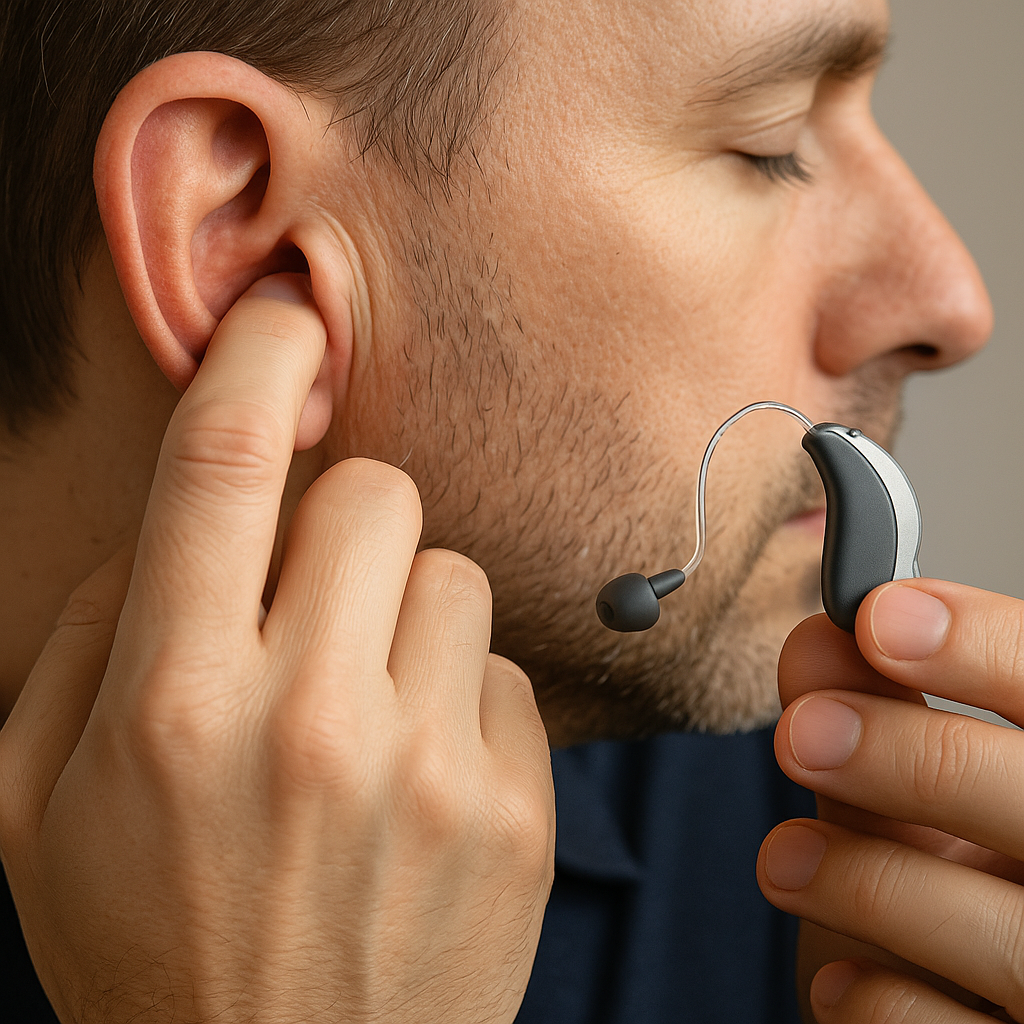For most people, hearing aids are comfortable and easy to wear. But a small percentage of users experience itchy ears, redness, or irritation caused by the materials in their hearing aids. This can be frustrating—especially since your hearing aids are meant to improve your quality of life, not cause discomfort.
As an audiologist, I occasionally see patients with allergic reactions to earmolds, domes, or tubing. Fortunately, there are practical solutions. Let’s look at what causes these reactions and what you can do about them.
Why Hearing Aids Cause Allergic Reactions
Allergic reactions typically come from direct skin contact with the materials used in hearing aids. The most common culprits are:
- Acrylic earmolds – Some people are sensitive to the chemicals in hard acrylic plastic.
- Silicone earmolds or domes – Silicone is softer and often hypoallergenic, but some patients react to it.
- Hearing aid tubing or coatings – Rarely, even the tubing or surface finish can cause irritation.
Symptoms may include:
- Persistent itching in the ear canal
- Redness or swelling
- Burning or sore spots
- Flaking or dry skin in the ear
If you notice these issues, don’t stop wearing your hearing aids—schedule an appointment with your audiologist to identify the cause and find a solution.
Solutions an Audiologist May Recommend
Audiologists have several ways to address allergic reactions without giving up your hearing aids.
| Solution | How It Helps | Notes |
|---|---|---|
| Hypoallergenic lacquer | A special coating applied to earmolds creates a barrier between the ear and material. | Inexpensive, often effective. |
| Switching materials | Try acrylic, medical-grade silicone, or other dome types. | Audiologist may trial different domes. |
| Titanium earmolds (Phonak) | Made from non-reactive titanium metal. | Strong, biocompatible, durable. |
| Gold-plated earmolds | Gold coating prevents irritation and allergic reactions. | Expensive, but often solves the problem completely. |
When to Consider Titanium or Gold Earmolds
- Phonak Titanium earmolds are an excellent choice for patients who react to both acrylic and silicone. They are lightweight, durable, and very well tolerated.
- Gold-plated earmolds are considered a “last resort” option due to their cost, but they provide near-universal skin compatibility. For patients who have tried everything else, this is often the permanent solution.
Other Tips to Reduce Itching and Irritation
Before moving to advanced custom earmolds, try these steps:
- Keep hearing aids clean – Cleaning your hearing aids prevents earwax and bacteria from worsening irritation.
- Dry ears thoroughly – Moisture can aggravate skin reactions. Consider a hearing aid dryer.
- Try lubricating drops – Ask your audiologist about safe ear moisturizers. One popular option is EarGene Ear Lotion, which is designed to soothe itchy ears without harming hearing aids.
- Rule out ear infections – Sometimes itching is caused by infection, not the hearing aid itself. See: Can Hearing Aids Cause Ear Infections?.
When to See Your Audiologist
If irritation persists beyond a few days, or you notice swelling, discharge, or pain, do not continue wearing your hearing aids without professional evaluation. Your audiologist can quickly identify whether the issue is allergic, infectious, or related to fit.
Important: Never ignore skin irritation. Leaving it untreated can worsen the condition and discourage consistent hearing aid use.
Final Thoughts
Allergic reactions to hearing aids are rare but real. The good news is that your audiologist has multiple strategies—from coatings to titanium earmolds—to help you enjoy comfortable, irritation-free hearing aid use. In almost every case, there’s a solution that allows patients to wear their devices successfully.
Skin irritation from hearing aids can be frustrating, but with hypoallergenic materials and proper care, most users find relief. To see how these issues fit into the bigger treatment landscape, read our Guide to Sensorineural Hearing Loss Treatment Options.
FAQs
Can I be allergic to my hearing aid domes?
Yes. While domes are usually made of hypoallergenic silicone, some people react to them. Trying a different dome style or material often solves the issue.
What’s the best material for sensitive ears?
Titanium earmolds (such as those made by Phonak) are highly biocompatible. Gold plating is also effective but costly.
Will my insurance cover gold-plated earmolds?
Usually not. Most insurance plans consider them a luxury upgrade, so patients pay out of pocket.
Is itchy skin always an allergy?
Not always. It could be dryness, an infection, or buildup of wax. That’s why it’s important to check with your audiologist.

